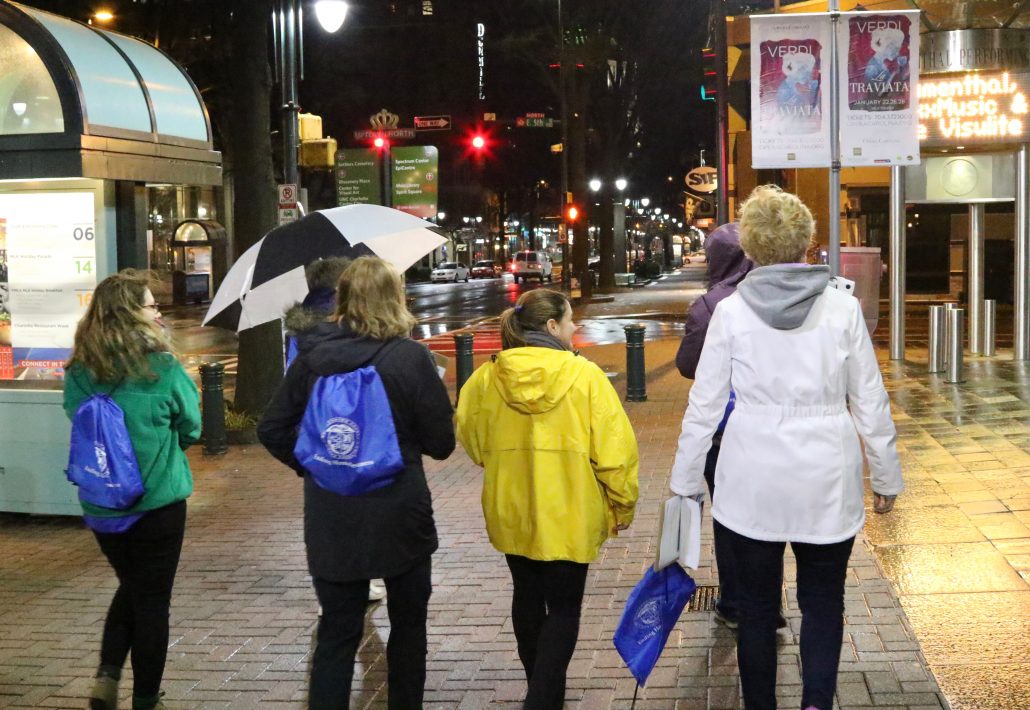Elyse Hamilton-Childres
Mecklenburg County Community Support Services
This week’s blog post offers a perspective from Elyse Hamilton-Childres, Prevention and Intervention Services Director with Mecklenburg County Community Support Services. Elyse has been working in the field of intimate partner violence since 2010.
This year marked my first time participating in the Point-in-Time (PIT) Count. I wanted to get involved for a number of reasons: 1) The domestic violence and homelessness fields have become more integrated and aligned. As a person who works with those involved in domestic violence, it is crucial that I understand the experience of homelessness more broadly. 2) I am a more effective leader when I take time to engage with people who may receive services from the programs I oversee. Data and research inform my work but cannot replace the value of lived experience and a human voice. 3) I believe in the power of authentic human interaction. I cannot end homelessness today; however, I can sit down with our homeless neighbors, shake their hands, hear their stories, and see them – really see them, and honor their dignity and worth. Participating in the PIT Count over seven days at three different locations was extraordinary.
This blog post covers a few of my insights and takeaways and how it can inform the work in Charlotte-Mecklenburg.
HOUSING IS A BASIC HUMAN RIGHT
The PIT reaffirmed my belief that housing is a basic human right. The cumulative impact of generational privilege is the fundamental factor separating my life trajectory from that of my homeless neighbors. No one should have to earn or “deserve” housing.
THERE IS A FACE & STORY BEHIND EACH NUMBER
The PIT personalized the data I have read and heard about how difficult it is to afford housing in Charlotte-Mecklenburg. Many of the individuals I surveyed were working or living on a fixed income. They were doing everything in their power to make ends meet, and still it wasn’t enough to place a roof over their heads.
THERE IS A NEED FOR SOLUTIONS THAT ADDRESS SYSTEMS & STRUCTURES
The PIT renewed my conviction that meaningful solutions to homelessness require confronting the systems and structures that perpetuate inequality and disparity. This includes combatting racism; changing housing policy; and holding systems and business leaders accountable for both higher paying jobs and affordable housing units.
SUPPORTIVE SERVICES MUST BE HOLISTIC
The PIT provided me a deeper understanding of how deinstitutionalization has failed people living with untreated severe and persistent mental illness. I have even more appreciation for programs that provide permanent supportive housing. Matching housing with supportive services serves individuals, especially those experiencing chronic homelessness, more holistically and successfully.
THERE IS GENDER DISPARITY IN HOMELESSNESS
Through the PIT, I observed firsthand gender disparities in how our society has traditionally approached homelessness. As I completed shifts at both the Salvation Army Center for Hope (which serves women and children) and at the Men’s Shelter of Charlotte (which solely serves men), I reflected on how patriarchal gender roles are embedded within human services. Though perhaps well-intentioned, the separation of households based on gender and age creates unintended consequences. Adult males may be either unsheltered or sheltered in their designated facility, while their female partners with dependent children are sheltered in a separate facility. As a result, women with dependent children are shouldered not only with the task of achieving housing stability, but also with parenting and supervising children in a shelter environment – which is no simple feat.
SO, WHAT
I am grateful that both the domestic violence and homelessness fields have begun to shift towards models such as Keeping Families Together and Safe & Together that recognize the importance of preserving the family unit whenever possible and safe. I also have a newfound appreciation and gratitude for small luxuries I often take for granted: clean clothes and showers every day; privacy; personal space; and good physical and mental health.
Most of all, my seven-day experience completing surveys during the 2020 Point-in-Time Count reminded me that we share more in common than have things that separate us. My interactions with others completing surveys evoked laughter, jokes, tears, anger, despair, and even hope – a range of responses that brought us together in the shared experience of what it means to be a human, and why we are called to take care of one another.
The PIT Count embodies one of my favorite quotes by Marcel Proust: “The only true voyage…would be not to visit strange lands but to possess other eyes, to see the universe through the eyes of another, of a hundred others, to see the hundred universes that each of them sees, that each of them is . . .”.
A few of our homeless neighbors shared their eyes with me for a brief time this past week; I am far better for it.
Elyse Hamilton-Childres, MSW is the Prevention and Intervention Services Division Director with Mecklenburg County Community Support Services. Elyse has been working in the field of intimate partner violence since 2010.


